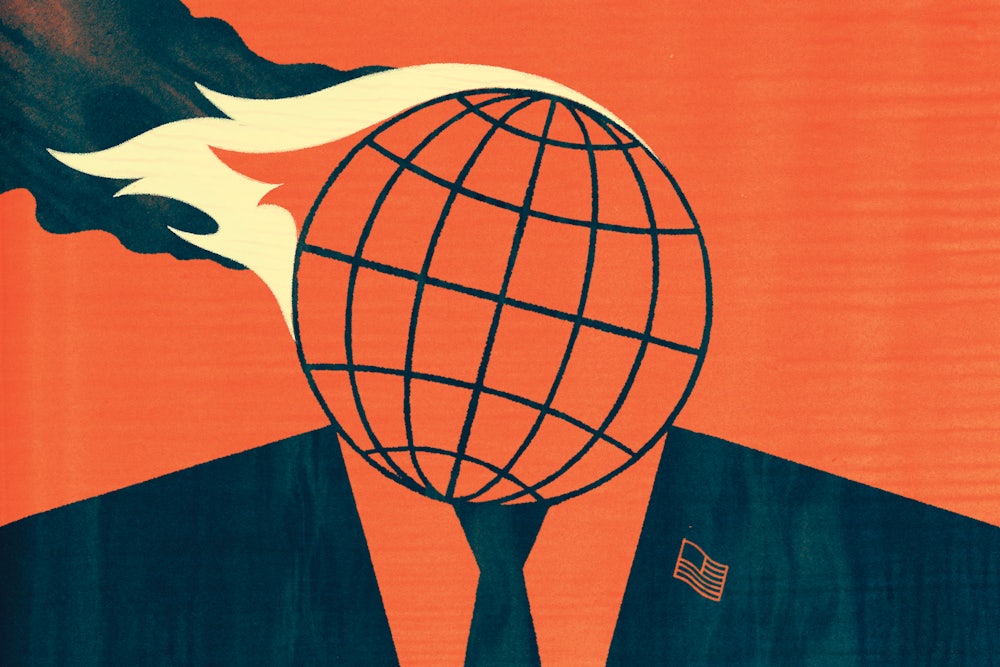Mike Pompeo, as a Kansas congressman from 2011 to 2017, was one of the largest recipients of oil and gas money in the House of Representatives. He voted against amendments to bills that declared that climate change was real and caused by humans; railed against international climate treaties and greenhouse gas regulations; and in a 2014 speech to the Kansas Independent Oil and Gas Association, called climate science “a religion out there that is advocating on behalf of making sure CO₂ doesn’t escape.” He is now Donald Trump’s pick to replace Rex Tillerson as secretary of state, and if confirmed by the Senate, he’d be the first top American diplomat to publicly reject the realities of climate science.
The United States has, historically, been responsible for the creation of most of the greenhouse gas emissions released into the Earth’s atmosphere. (China leads the way now.) As a result, other countries have long expected the secretary of state to take a leadership role on climate issues. Former Secretary Colin Powell, for example, said he was hampered by President George W. Bush’s refusal to sign the Kyoto Protocol, an earlier global warming treaty. “Everything the American president does has international repercussions,” he told The New York Times in 2002. Those repercussions took more than a decade to resolve. It wasn’t until twelve years later, in 2014, that Barack Obama’s secretary of state, John Kerry, was able to help persuade almost 200 nations to attend the talks in Lima, Peru, that eventually led to the Paris climate agreement.
Tillerson—who, despite working for ExxonMobil for four decades, has repeatedly said that climate change is real and harmful—allowed career employees at State to continue their work on climate issues. “I didn’t see any evidence of interference from the secretary’s office to the positions taken by the negotiators,” said Andrew Light, a former State Department climate adviser. Last November, officials from the Office of Global Change—a State Department division created under President Ronald Reagan in 1988 to oversee the country’s international environmental policy—were allowed to attend a series of negotiating sessions over the Paris agreement in Bonn, Germany, where they worked on finalizing policies to ensure transparency and accountability from countries that have promised to reduce carbon emissions. (The United States is still party to the Paris agreement; despite Trump’s pledge last summer to withdraw, he can’t until 2020.) They are also working on the language in two major, upcoming scientific reports—one from the Intergovernmental Panel on Climate Change on the impacts of mild global warming, and another from the U.S. National Climate Assessment on expected climate impacts in America.
Pompeo’s tenure suggests that a change in American negotiating posture could be forthcoming. It seems unlikely that any secretary of state under Donald Trump was going to advocate for a strong climate agenda, but at least Tillerson could be expected to find common ground with other countries, according to James Connaughton, a former environment adviser to President George W. Bush. He cited Tillerson’s willingness to address unfair competition from China’s manufacturing sector and to promote clean energy development abroad. “Tillerson was uniquely positioned to address that part of diplomacy,” he said.
Trump has said he wants to withdraw from the Paris agreement and renegotiate its terms. But the administration has now lost almost everyone capable of that work: A top international environmental policy adviser, George David Banks, resigned in February. Gary Cohn, Trump’s chief economic adviser, who negotiated directly with climate ministers from other countries, resigned in March. “Those are big losses that will take you a while to come back from,” said Connaughton.
Restaffing won’t be easy. “There aren’t a whole lot of Republicans who can represent the president’s perspective on climate while at the same time be able to navigate complicated climate diplomacy,” Banks said. Achieving that would require a political will on the subject that neither Trump nor Pompeo appears to have. “I guarantee you climate policy had zero influence on Trump’s decision to hire Pompeo,” Banks added.
The erosion of American engagement in climate diplomacy has already allowed China to become the de facto world leader on global environmental policy. China has become more assertive about climate leadership, with President Xi Jinping pledging last year to make the country the “torch-bearer in the global endeavor for ecological civilization.” European powers, too, have begun turning to China, not the United States, for partnerships on climate issues. And with Pompeo in charge, America’s standing could erode still further. “Even if we’re still continuing to send capable negotiators to climate conferences, the real loss is our political influence, which is being scooped up by the Chinese left and right,” Light said. “Are the Chinese doing it because they’re planetary good guys? No—they see this appropriately as an issue of international influence and leverage.”
Fortunately, there’s a structural limit to how much damage Trump and Pompeo can do. The Paris agreement was written to withstand assaults from a hostile administration, said Paul Bodnar, who led the negotiations as Barack Obama’s senior director for energy and climate. “We designed the agreement in a way that was robust to shocks,” he said. “We knew that the U.S. is like the Dr. Jekyll and Mr. Hyde of climate. When we’re the good Dr. Jekyll, we have to make sure the rest of the world can withstand us when we turn into Mr. Hyde.”
It is possible that Pompeo, when confronted with the gravity of representing his country abroad, will realize the importance of preserving America’s credibility on this issue and stop the United States from formally withdrawing from Paris. But it’s hard to see an isolationist and climate-denying United States retaining its traditional leadership role. And if that happens, the still-fragile agreements and international coalitions created in Paris to stop climate change will be at risk.
